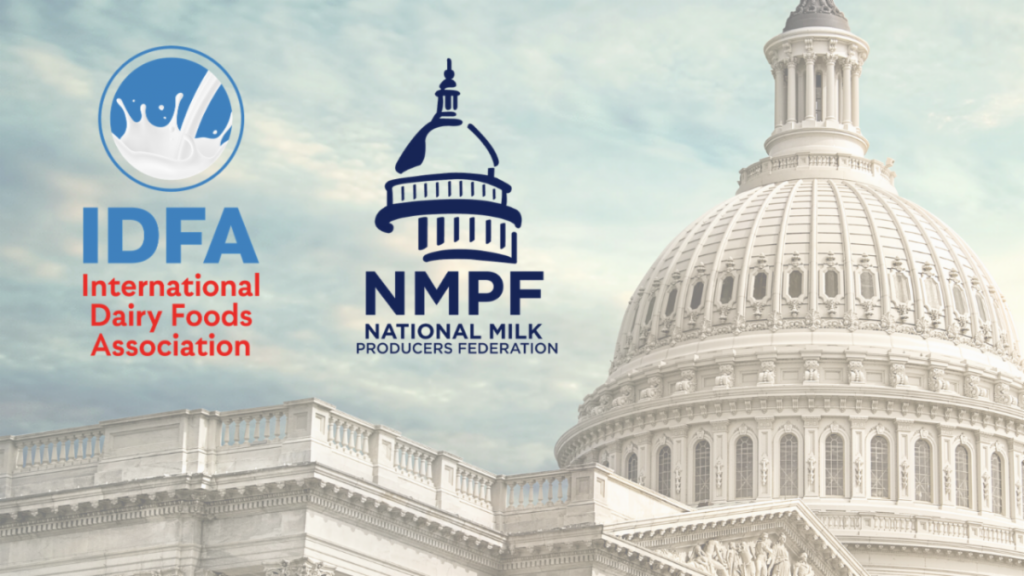CONTACT
Gene Grabowski, International Dairy Foods Association
(202) 270-6560
Alan Bjerga, National Milk Producers Federation
(703) 469-2372
WASHINGTON, May 26, 2021—A bipartisan group of more than 50 members of the U.S. House of Representatives today sent a letter to U.S. Department of Agriculture (USDA) Secretary Tom Vilsack urging USDA to address the underconsumption of dairy foods among American school-aged children, specifically by making permanent a current flexibility that allows schools to offer low-fat flavored milk—a nutrient dense option for improving the quality of children’s diets.
The letter cites the 2020 Dietary Guidelines Advisory Committee report, which found that 79 percent of 9–13-year-olds, who rely on the school meal programs to meet their nutritional needs, are not meeting the recommended intake of dairy foods. “Both the 2015 and 2020 editions of the Dietary Guidelines for Americans (DGAs) amplified this concern, stating that, beginning at a young age, average dairy consumption falls short of recommended amounts,” the letter states.
While current USDA flexibilities allow schools to offer low-fat flavored milk through the 2021-2022 school year, USDA has before it a proposed rule that would make these flexibilities permanent. Importantly, this action would remain consistent with the 2020-2025 Dietary Guidelines for Americans.
The International Dairy Foods Association (IDFA) and National Milk Producers Federation (NMPF) today issued the following statements applauding the lawmakers’ proposed solution to addressing underconsumption of dairy among school-aged children:
“Milk, including low-fat flavored milk, is an important way for children to access the nutrient profile of dairy, providing thirteen essential nutrients and unique health benefits,” said Michael Dykes, D.V.M., President and CEO, International Dairy Foods Association. “IDFA appreciates the leadership of the more than 50 champions for dairy in the House of Representatives for encouraging USDA to prioritize dairy in federal nutrition programs, specifically through the inclusion of low-fat flavored milk in school meal programs. Right now, USDA has before it a proposed rule that would return to flexibilities allowing flavored, low-fat milk to be served in child nutrition programs, and IDFA strongly encourages the USDA to adopt school milk flexibility in the rule as a long-term solution. By doing so, the USDA would help ensure more kids meet the recommended intake for dairy set forth in the 2020-2025 Dietary Guidelines for Americans.”
“Milk benefits children in many ways – but it can’t benefit them at all if they don’t drink it, and ensuring that they do so requires a wide range of options,” said Jim Mulhern, President and CEO, National Milk Producers Federation. “Milk’s unique nutritional package is of great benefit to the nation’s schoolchildren, and this message to Secretary Vilsack strongly supports the critical goal of boosting consumption of essential nutrients of public health concern, including calcium, potassium, and vitamin D. The 2020 Dietary Guidelines Advisory Committee report found that 79 percent of 9-13-year-olds, who rely on school meals to meet their nutritional needs, are not meeting the recommended intake of dairy foods. Milk provides the foundation of a lifetime of better health, and we thank the signers of this letter, led by Reps. Courtney and Thompson, for recognizing and advancing its benefits.”
# # #
The International Dairy Foods Association (IDFA), Washington, D.C., represents the nation’s dairy manufacturing and marketing industry, which supports more than 3 million jobs that generate $159 billion in wages and $620 billion in overall economic impact. IDFA’s diverse membership ranges from multinational organizations to single-plant companies, from dairy companies and cooperatives to food retailers and suppliers, all on the cutting edge of innovation and sustainable business practices. Together, they represent 90 percent of the milk, cheese, ice cream, yogurt and cultured products, and dairy ingredients produced and marketed in the United States and sold throughout the world. Delicious, safe and nutritious, dairy foods offer unparalleled health and consumer benefits to people of all ages.

